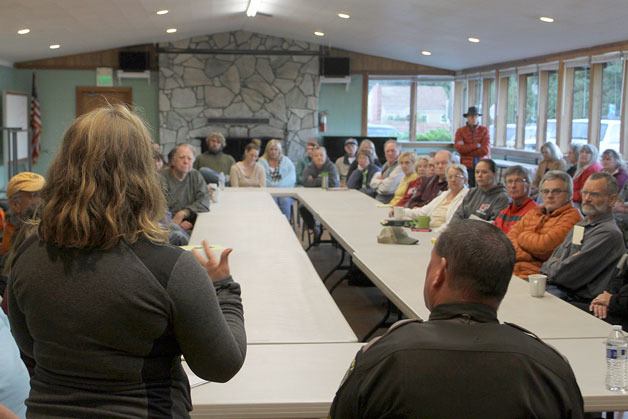Though a storm just passed through South Whidbey, another one of frustration and anger was unleashed at a Clinton community meeting Monday night.
Residents voiced their concerns about drugs and homelessness in Clinton at the meeting held at Clinton Community Hall. Around 60 people attended the open forum, which was organized by the Clinton Chamber of Commerce.
Though the number of problems outnumbered proposed solutions, Clinton Chamber of Commerce President Stephanie Cook said it was a step in the right direction. Organizers of the meeting gathered emails from attendees for communication purposes. They also plan to start community watches and work with the Sheriff’s Citizen Patrol to combat the problem.
“I think everyone got out what they needed to get out and there was some great help,” Cook said. “I think it was a good public, community conversation. Everyone came together and got everyone else’s take on it, too.”
Lt. Evan Tingstad, Sgt. Darren Crownover and Chief Criminal Deputy Rick Felici with the Island County Sheriff’s Office were present to answer crime-related questions. Also in attendance were Jackie Henderson and Skye Newkirk of Island County Human Services, Island County Commissioner Helen Price Johnson and state Rep. Norma Smith, R-Clinton.

Some of the frustration was aimed toward the sheriff’s department, which residents criticized for not doing enough to combat the problem. Others felt unsafe in the Clinton area, especially around Deer Lake and on Humphrey Road.
Megan Kukuk, a Clinton resident who works at Southern Cross Espresso, said she sees drug activity at around 4 a.m. By the time deputies patrol the area at 7 a.m., the problem has moved elsewhere.
“I don’t particularly feel safe, especially that early in the morning,” Kukuk said. “I love to see your presence, it’s just not during the sketchy hours.”
Crownover and Tingstad said the sheriff’s office is short-staffed and has a large coverage area, making it difficult to patrol every place of concern.
Kukuk said a free self-service vending machine behind the community hall also contributes to the problem. The vending machine is meant for homeless youths and provided by Whidbey Island Nourishes, but can also give homeless and drug users a steady supply of food. Dan Porter Park and the Clinton Park and Ride are also hubs for people sleeping in the woods and in their cars, residents said. Cook said storage units behind Cozy’s Roadhouse also provide shelter for drug users and homeless people.
Price Johnson said that in preparation for the meeting, she spoke with the Island County Parks and Recreation Department and asked what it would take to clean out underbrush on the side of the park and ride and behind the Clinton Library.
“We have very few park staff, but this is a big issue,” Price Johnson said. “If we could at least begin to clear that out, it would be less of a haven.”
Some residents also felt the activity happening in neighborhoods is a result of negligent property owners and that they should be held accountable. Other questions included what residents could do to help crack down on the issue, if there are any drug-prevention efforts being made by the county, if syringe disposal stations can be installed, and if there are any trends on crime statistics. Tingstad said reported crimes have been low in the past six months and that quality-of-life calls have seen an increase, such as heroin syringes or backpacks with dirty clothes in it being found in public places. He added that sex crimes are also a major issue in the county.
Tingstad and Crownover said residents are the biggest help when they report crimes or suspcious activity as they are happening, rather than after the fact.
Though some in the crowd wanted sheriffs to do something about the homelessness issue, Tingstad said the sheriff’s office is not an organization that pushes people out of the community, and that being homeless isn’t a crime.
In regard to prevention efforts, Newkirk and Henderson said the department is utilizing a grant for an opioid outreach program that will allow the department to meet with those afflicted with addiction and draw them into treatment.
“A wise man once said, ‘You can’t arrest your way out of this problem,’ ” Newkirk said. “People are arrested, they spend some time in jail, they come out and then the problem persists. They’re still homeless and they’re still addicted. But, if we’re able to help them get sober and into recovery and get them jobs and housing, then perhaps we can shore up that.”
Cook said her biggest takeaway from the night was getting everyone on the same page.
“We’re all here, we all care, so let’s all discuss it and meet in some place where we do that,” Cook said.
Tingstad said after the meeting that he wasn’t sure there is one specific step that needs to be taken to move forward. Rather, continuing the community conversation and airing their concerns will help narrow down a course of action. He also said it was important that people were aware of the sheriff’s limitations, manpower-wise.
“They understand what we can do,” Tingstad said after the meeting. “We understand what their frustrations are and what they want us to do. Then, we come together in the middle to figure out how to get it done. It’s a lot easier to serve people when you know what it is they’re looking for.”
“Sometimes we just can’t take care of everything,” he added.
Kukuk said after the meeting that it was a good start.
“We’ll have to narrow down the importance of what’s going on and what we want done,” Kukuk said. “I want these people gone.”


